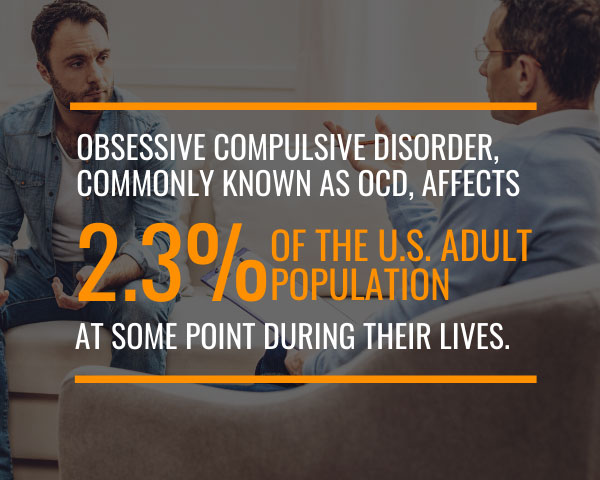
Obsessive Compulsive Disorder, commonly known as OCD, affects 2.3% of the U.S. adult population at some point during their lives. Most people with OCD experience intermittent episodes of compulsion, obsessions, and ritual behavior over periods of a few months to over a year, with an estimated 1.2% of the population experiencing OCD at any given time. In some cases, OCD can be chronic in that it mostly never goes away. In others, it can be intermittent, vanishing for months or even years before resurfacing. But, in all its forms, OCD heavily impacts the life and quality of life of individuals struggling with it. At the same time, Obsessive Compulsive Disorder is poorly understood by the general public, leading many to fail to seek out treatment.
Even when people are aware that their behavior doesn’t make sense, they often see nothing out of the ordinary from their own patterns.
About 50.6% of OCD patients experience significant impairment because of their disorder, 34.8% experience moderate impairment, and 14.6% experience symptoms at a level where they only mildly impact daily life. OCD can cause significant stress, distress, and waste time. Seeking treatment can greatly improve quality of life, reduce symptoms, and allow you or your loved one to live a normal, healthy life.
If you or a loved one is struggling with OCD, there is help. Obsessive Compulsive Disorder Treatment involves targeted prescription medication, psychotherapy, counseling, which can help to resolve compulsions and obsessions, improve quality of life, and restore normalcy.
Common Symptoms of OCD
Obsessive Compulsive Disorder is characterized by intrusive thoughts, obsessive behaviors, and routines or obsessive patterns of behavior. While there are many types of OCD, most individuals show roughly the same types of symptoms:
OCD can manifest in different ways; in some cases, those different ways are called “Types”.
Common Types of Obsessive-Compulsive Disorder
While Obsessive Compulsive Disorder can fall into other types, there are four primary Types.
Checking – The individual compulsively and repeatedly checks to be sure things are off, okay, or healthy. This might include checking locks and locking and unlocking the door to ensure it’s locked checking the oven, checking light switches, or checking up on one’s own health.
Contamination – An unreasonable fear of physical or mental contamination, typically resulting in refusal to touch things, irrational cleanliness, compulsive cleaning, and avoidance.
Symmetry and Ordering
Individuals feel an excessive need to create symmetry or order, typically resulting in organizing and reorganizing items.
Rumination/Intrusive Thoughts
Obsessive and disturbing intrusive thoughts, outside of the user’s control and causing significant distress. These are often violent and/or sexual.
In many cases, users will experience more than one type. In others, you will fall completely into a single Type.
Diagnosing Obsessive Compulsive Disorder
Many people struggle with compulsions, but obsessive-compulsive disorder takes up a significant portion of your time and day. The Diagnostic and Statistical Manual 5 defines OCD when:
The individual may believe their obsessions and compulsions are rational and fair, they may realize they are sometimes over the top, or they may cause significant distress as the individual realized they are irrational but is compelled to do them anyway.
Most cases of OCD are diagnosed before the age of 19, but it is not unheard of to be diagnosed after the age of 35. However, diagnosis will involve a thorough review of current and past medical conditions to ensure that the symptoms cannot be better explained by another condition.
Prescription Medicine for OCD
 Prescription medication is the primary treatment option for obsessive compulsive disorder. In most cases, prescription medications include a drug-class known as Selective Serotonin Reuptake Inhibitors or SSRI’s. These drugs typically take 8-12 weeks to begin functioning. In some cases, your doctor will also recommend anti-psychotic medications to supplement SSRIs.
Prescription medication is the primary treatment option for obsessive compulsive disorder. In most cases, prescription medications include a drug-class known as Selective Serotonin Reuptake Inhibitors or SSRI’s. These drugs typically take 8-12 weeks to begin functioning. In some cases, your doctor will also recommend anti-psychotic medications to supplement SSRIs.
- citalopram
- escitalopram
- fluoxetine
- fluvoxamine
- sertraline
- aripiprazole
- risperidone
Psychotherapy and Counseling for OCD
Psychotherapy is typically recommended as a complementary therapy to be delivered alongside prescription medication. In some cases, it is also recommended instead of prescription medication or when prescription medications have failed. Here, behavioral therapies such as Cognitive Behavioral Therapy and Habit Reversal Training are the most common.
Obsessive Compulsive Disorder Treatment Centers
If you or a loved one is struggling with obsessive thoughts and compulsive behavior, it’s important to get help. OCD can significantly impact your quality of life, relationships and your ability to work or study. Most importantly, there are treatments that will reduce the impact of OCD on your life, so that you can return to a healthy state. In most cases, your doctor will recommend a prescription medication, followed by intensive CBT. OCD treatment is delivered in outpatient and inpatient or residential settings.
OCD is complex, life-changing, and may flare up or remain a constant throughout your life. In either case, seeking treatment, learning behavioral techniques to offset compulsive behavior, and getting OCD under control will improve your life.